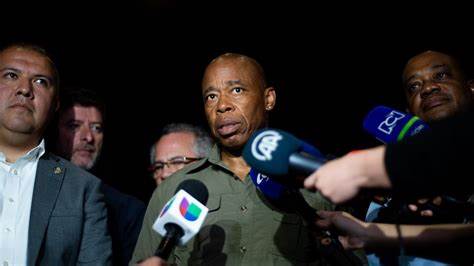NO MORE ROOM IN NEW YORK CITY
New York City finds itself grappling with increasingly strained resources as it attempts to address the surge of incoming migrants. In a desperate bid to dissuade newcomers from settling within its already overcrowded boundaries, the city has initiated a novel strategy: offering migrants a one-way plane ticket to exit the metropolis.
Migrants who were displaced from city shelters are being directed to a Manhattan "reticketing" office solely dedicated to booking flights to destinations across the globe. Some individuals have opted to jet off to countries like Colombia or Morocco, seeking relief from the city's mounting pressures.
City Hall spokesperson Kayla Mamelak, recognizing the absence of a foreseeable resolution, stated, "With no sign of a decompression strategy in the near future, we have established a reticketing center for migrants. Here, the city will intensify its efforts to procure tickets for migrants, assisting them in taking the next steps of their journeys."
Mayor Eric Adams has persistently sounded the alarm about the city's diminishing capacity, stating unequivocally, "When you are out of room, that means you're out of room." He likened the situation to the annual influx of relatives at Thanksgiving, stressing that there is simply no more room to accommodate newcomers.
New York City is now contending with the challenge of absorbing tens of thousands of undocumented migrants who have poured into the city over the past year. The arrival of over 130,000 migrants since last year has stretched the city's resources to their limits, compelling the establishment of new facilities to house them.
Recent weeks have witnessed a further surge in arrivals, with approximately 600 migrants arriving in the city each day. Over the summer, the city even resorted to distributing flyers at the southern border, warning migrants that there is "no guarantee" of shelter in New York and encouraging them to consider other destinations.
The city has already expended more than $1.2 billion to support migrants and anticipates this figure could rise to $5 billion. Mayor Adams has expressed his concerns, declaring, "This issue will devastate New York City. We're receiving 10,000 migrants a month... Every community in this city is going to be impacted."
To address the space constraints, the city has implemented new policies, such as limiting the duration of migrant family shelter stays. Families with children are now required to reapply for housing within the city's shelter system every 60 days. This measure is intended to prompt recently arrived migrants to seek alternative housing.
A similar policy is already in place for single adult migrants, who must reapply for shelter housing every 30 days. Preliminary data suggests that the policy is proving effective, as fewer than 20% of migrants who received eviction notices have reapplied for shelter.
In the midst of these challenges, Mayor Adams is actively seeking to suspend the city's "right to shelter" obligation, which mandates providing shelter to anyone who requests it. City Hall's legal team is engaged in litigation to address this issue in Manhattan Supreme Court.
Should the "right to shelter" obligation remain intact, the city will be compelled to continue finding accommodation for migrants who reapply for shelter. As a response to the space shortage, the city has opened over 200 emergency shelters and is contemplating the creation of a substantial "semi-congregate" facility designed to house 500 families, a move that may potentially conflict with state regulations mandating separate rooms for each household.



Comments
Post a Comment